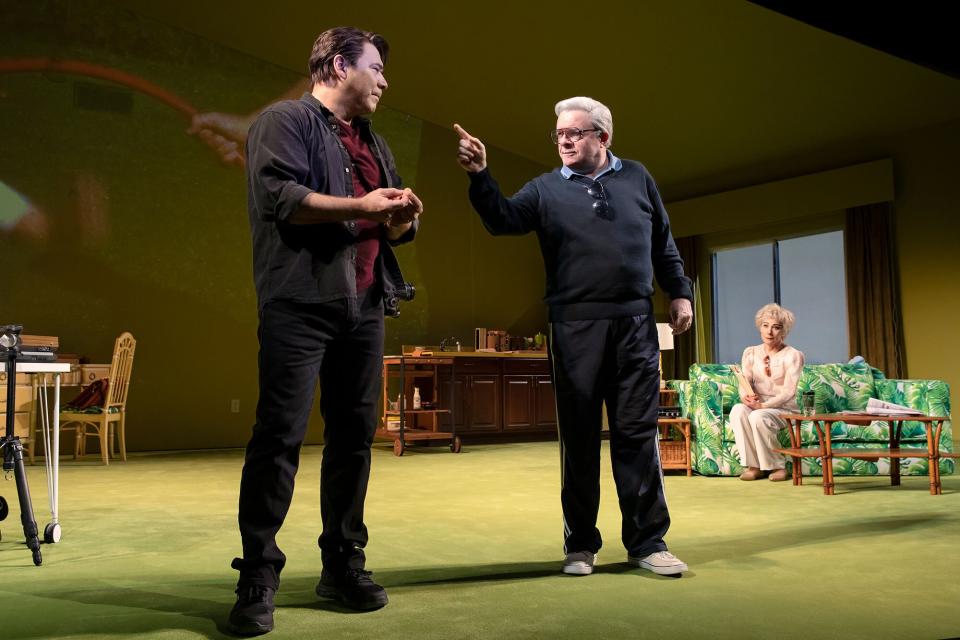Pictures from Home review: The parent trap

- Oops!Something went wrong.Please try again later.
- Oops!Something went wrong.Please try again later.
- Oops!Something went wrong.Please try again later.
How well can we ever know the people who made us? And how well do they even want to be known? It's been just over 30 years since Larry Sultan released his landmark photographic memoir Pictures from Home — evocative, impeccably composed portraits of his aging parents that captured a sort of Mad Men tableau frozen in time: Whipped-meringue hairdos, golf swings in the living room, shag-pile carpets in loamy shades of green and gold.
The photos were aesthetically striking on their own, but the larger intention was clear: to interrogate not just what his mother and father meant to him, but how an entire generation, now nearing the end of their lives, had been shaped by midcentury American ideals of image, aspiration, and personal success. That book has now become a play, for better and worse, by Sharr White (The Other Place, The Snow Geese) — a warm and chatty adaptation that both lifts Sultan's life off the page and loses something ineffable in the translation.

Julieta Cervantes Danny Burstein, Nathan Lane, and Zoe Wannamaker in 'Pictures from Home'
Sharr couldn't, at least, have found a more iconic class of decorated Broadway performers for what turns out to be a pure three-hander: Danny Burstein (most recently a 2021 Tony winner for Moulin Rouge!) as Larry; Nathan Lane as his proud, ornery father Irving; and West End veteran Zoë Wanamaker as his bird-like mother Jean. It's the late 1980s and Larry, a photography professor in the Bay Area, flies down regularly to his old family home in the San Fernando Valley, represented here in a symphony of mod olives and mustards and Rat Pack decor (by The Light in the Piazza scenic designer Michael Yeargan).
Larry has a pregnant wife and young son at home, but he can't seem to stay away from the Valley; the pull of constantly documenting his parents — of buzzing over them like a grown-man housefly, essentially — is too strong. Irv reads the paper and shuffles around the garden in his Adidas tracksuits; Jean flutters in and out distractedly, still happily (pre)occupied with her work selling real estate. But Larry needs to know what it all means: His father's businessman bluster — he sold Schick razorblades for decades — and emotional avoidance; his mother's willingness to move her whole life from Brooklyn to California for her husband's ephemeral dream.
They both oblige him to a point, revisiting old family lore and even recreating bygone moments for his camera, like Irv's earnest whiteboard interpretation of Dale Carnegie's How to Win Friends and Influence People. But they can't seem to understand his aim, or his urgency. "Where's the rigor?" Irv demands, appealing to an unseen audience. "He comes down here, he pussyfoots around. Half of the time his tape recorder doesn't work, and he wants me to repeat conversations that just happened moments ago organically."
Signature images from Sultan's book, projected widely onto the rear wall of the stage, do a lot of the work of evoking feelings that the somewhat sitcom-ish rhythms of Sharr's text don't reach. Remote fathers, nurturing but evasive mothers, old emotional wounds and papercuts: None of this new, or particularly specific in his hands. "You act as if you're the only child in the world. And as if we're the only parents," Jean tells her son with exasperated affection.
And that's the central problem, maybe, with this production, as faithfully acted and capably executed as it is at nearly every level (Tony winner Bartlett Sher, late of To Kill A Mockingbird and My Fair Lady, directs with a steady, generous hand). It's only in the last ten minutes that the show seems to tap into Sultan's work on a deeper level, rather than merely manifest it for the stage, an effort that can often otherwise feel like dancing about architecture. In those final moments — tender, mournful, gently profound — Pictures finds its way home. Grade: B
Related content:

